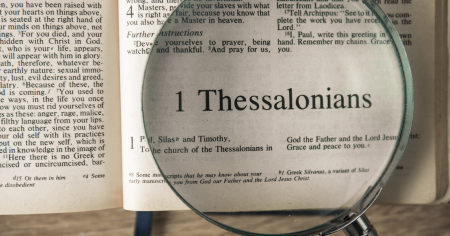Bulletin

"Great is Your Faithfulness"
Thursday, May 11, 2023
Despite the example of the northern nation of Israel (cf. Jeremiah 3:6-10), and numerous warnings from God with calls to repentance, Judah was carried into Babylonian captivity. In 586 B.C., Jerusalem and the temple were destroyed. Lamentations is a book of dirges reflecting on the destruction witnessed by the prophet. However, the darkness of the book is penetrated by light of the unfailing love and faithfulness of God. It honestly assesses great tragedy while framing it in God’s lovingkindness. Jeremiah accepts the righteous actions of God toward His rebellious people but struggles under the weight of His wrath. However, he expresses his faith that the Lord’s compassions outweigh great sorrow.
While the book concerns a people severely punished for unfaithfulness it provides a standard of facing tragedy and turmoil with confidence in God. God’s unfailing mercies, compassions, and His great faithfulness will bring those who turn to Him out of despair, be it the consequences of sin, or the frailty of life under the sun. Lamentations 3:19-33 contains a powerful message we would do well to meditate on.
Cast Your Care Upon the Lord (vv. 19-21)
“Remember my affliction and roaming,
The wormwood and the gall.
My soul still remembers
And sinks within me.
This I recall to my mind,
Therefore I have hope.”
In verse 18, Jeremiah said, “My strength and my hope have perished from the Lord.” This was not expressing a lack of faith but was an honest take on the experience of his suffering. He then approaches God with his great affliction, and inward turmoil. He casts his cares upon God (cf. 1 Peter 5:7). He has hope knowing this recollection brings his troubles before the One who can alleviate them.
Hope in the Lord (vv. 22-24)
“Through the LORD’s mercies we are not consumed,
Because His compassions fail not.
They are new every morning;
Great is Your faithfulness.
‘The LORD is my portion,’ says my soul,
‘Therefore I hope in Him!’”
Even in this great hour of affliction the writer finds a ray of light. The fact that the people are not entirely consumed is evidence of the mercies of God which proceed from His unfailing compassion. There is a constant renewal of the mercies and compassions of God each morning. Even in time of great suffering He is expressing His faithfulness as One who cares for His people. Jeremiah realizes that regardless of the circumstances God is all he needs, and he hopes in Him.

Wait for the Lord (vv. 25-27)
“The LORD is good to those who wait for Him,
To the soul who seeks Him.
It is good that one should hope and wait quietly
For the salvation of the LORD.
It is good for a man to bear
The yoke in his youth.”
Hoping in God and waiting for Him go hand in hand. Waiting for God is an action of faith. It is the quiet persistence of trust that God’s intentions for His people are always pure and beneficial, and therefore maintains fidelity to Him in the hour of trial. The people of God were experiencing their greatest trial yet and needed to bear it faithfully for God to carry out His will for them in it. For this reason, it is good to be practiced in bearing the yoke of affliction even in youth.
Humble Yourself Before the Lord (vv. 28-29)
“Let him sit alone and keep silent,
Because God has laid it on him;
Let him put his mouth in the dust—
There may yet be hope.
Let him give his cheek to the one who strikes him,
And be full of reproach.”
In such a trial what remains to be done is a humble acceptance of the plight (cf. Job 1:20-22). It is not a sign defeat, but of the reverence of faith and hope in God. He remains in control, and we must remain under His control. It is not in the resistance of the trial that we find victory in Him, but in the quiet and confident endurance of it.
The Lord Will Lift You Up (vv. 31-33)
“For the Lord will not cast off forever.
Though He causes grief,
Yet He will show compassion
According to the multitude of His mercies.
For He does not afflict willingly,
Nor grieve the children of men.”
The faithful waiting and hoping in the God of unfailing mercies, compassions, and great faithfulness does not end in disappointment. The progression leads to grounds for comfort. First, the sorrow and anguish will end. Nothing is forever on this side of eternity. Second, where immense grief is borne, the compassion of God is overwhelming. His allowance of affliction is not with absence of His care. Finally, the suffering brings God no amount of joy. It is used by Him to produce the “peaceable fruit of righteousness” (Hebrews 12:11). His wisdom comprehends the unsearchable realities of eternity and merits our confidence. His faithfulness is truly great! Hope in Him!

The Thessalonians' Example
Thursday, May 04, 2023
The first epistle to the Thessalonians begins with a thankful remembrance of the faith displayed by the recipients of the letter. It impresses us with the power of our actions. Even the great apostle Paul was astounded by the faith of these brethren. Genuine faith can reach beyond the limits of our known geography. Paul explains, “you became examples to all in Macedonia and Achaia who believe. For from you the word of the Lord has sounded forth, not only in Macedonia and Achaia, but also in every place. Your faith toward God has gone out, so that we do not need to say anything” (1 Thessalonians 1:7-8). Their faith caused God’s word to echo throughout the land, and throughout time – even today their example speaks volumes. We should listen and learn.
Paul noted a special trio displayed by the Thessalonians – “remembering without ceasing your work of faith, labor of love, and patience of hope in our Lord Jesus Christ in the sight of our God and Father” (1 Thessalonians 1:3).
- Work of faith – The gospel preached to them by the apostle led to their faith (cf. Romans 10:17). This sincere conviction in the truth of Christ, and corresponding trust in Him as their gracious Savior manifested in activity. They walked in the good works prepared by God for them in Christ (cf. Ephesians 2:10).
- Labor of love – The work that sprang from their faith in God was laborious. Their activity was burdensome. Effort of this kind is not borne by anything less than an intense love for God (cf. 1 John 4:19). It is the spirit (disposition) of love which God has given to us that “nerves the soul to great enterprises, and sustains it in the deepest sorrows” (Barnes) (cf. 2 Timothy 1:7).
- Patience of hope – As faith produced work, and love motivated intense labor, their hope produced “steadfastness” (NASB, ESV). Tribulation was a concomitant of their faith, but their faith was the substance of their hope (cf. Hebrews 11:1). Despite the weight of adversity, they bore up under it in faith knowing the surety of God’s reward (cf. Hebrews 11:6).
Furthermore, Paul mentioned how they followed the apostles’ example in that they “received the word in much affliction, with joy of the Holy Spirit” (1 Thessalonians 1:6). When the brethren accepted the gospel Paul preached, they signed up for tribulation (cf. Acts 14:22; 2 Timothy 3:12). Truth comes at a cost, but it pays dividends. There is “joy and peace in believing” as we are made to “abound in hope by the power of the Holy Spirit” (Romans 15:13).
 Specifically, the resounding example of the Thessalonians which reached even Macedonia and Achaia regarded their noble reception of the gospel and its proclaimers. “For they themselves declare concerning us what manner of entry we had to you” (1 Thessalonians 1:9). Paul later explained, “when you received the word of God which you heard from us, you welcomed it not as the word of men, but as it is in truth, the word of God, which also effectively works in you who believe” (1 Thessalonians 2:13).
Specifically, the resounding example of the Thessalonians which reached even Macedonia and Achaia regarded their noble reception of the gospel and its proclaimers. “For they themselves declare concerning us what manner of entry we had to you” (1 Thessalonians 1:9). Paul later explained, “when you received the word of God which you heard from us, you welcomed it not as the word of men, but as it is in truth, the word of God, which also effectively works in you who believe” (1 Thessalonians 2:13).
As they had great evidence (cf. 1 Thessalonians 1:5) to believe the word spoken was not of earthly origin, but that from heaven, they acted upon it in dramatic ways. They completely changed their lives. Idol worship and everything surrounding it characterized their entire existence, and they threw it all away to “serve the living and true God” (1 Thessalonians 1:9). Oh, that we would have the same mindset to change our ways for God.
Finally, as they had repented of their sins and been converted, “times of refreshing” came from the Lord’s presence (cf. Acts 3:19). Once duped by false gods who could offer nothing, they were begotten again to an eternal inheritance (cf. 1 Peter 1:3-5). From that point they anticipated with great confidence, faithfulness and joy the day they would see their Savior (cf. 1 Thessalonians 1:10).
The Thessalonians’ example speaks to us today. Do we reflect their work of faith, labor of love, and patience of hope? Do we receive the word with great joy despite the tribulation which accompanies it? When the word is preached in truth, do we acknowledge it is not the man’s opinion or wisdom who speaks it, but it is the Divine will of God? Do we unhesitatingly repent when we are convicted of sin? Are we eagerly waiting for the coming of Jesus with penetrating focus? Let us imitate the Thessalonians’ example.

The Preeminent Christ
Thursday, April 27, 2023
The gospel reveals the centrality of Christ in all things. In fact, the gospel is the eternal plan of God to return everything to its proper order in Christ (cf. Ephesians 1:9-10; 3:10-11). The world is more Christ-centered than it might think, and for this unawareness it is not nearly as Christ-centered as it should be. Sadly, despite some being aware of Christ and the great position He holds, through self-will they redefine what Christ-centeredness is, and ironically dismiss Him in their activities of life. We who bear the name of Christ and who seek to bear His image should realize the intense focus placed upon Him in the gospel. This must result in the Christ-centered life as revealed in scripture.
Paul’s epistle to the Colossians focuses on Christ at the center of all. The Holy Spirit used a specific term which speaks volumes about Christ’s importance – “that in all things He may have the preeminence”(Colossians 1:18). “Preeminence” means “to hold the highest rank in a group, be first, have first place” (BDAG). The NASB translates the verse, “that He Himself will come to have first place in everything.” It is imperative we understand the preeminence of Christ and reflect it in our lives. The epistle to the Colossians details the preeminent Christ.
Christ has the preeminence in:
Creation – Christ is supreme in creation because He is the Creator. Jesus was not merely a man but was God in bodily form (cf. Colossians 2:9). He is the very image of God. That He is “firstborn” (Colossians 1:15) is not indicative of being the first that was created – as that would contradict the next verse – but as having priority and sovereignty. Every facet of creation, whether “visible [or] invisible” (Colossians 1:16), was “created through Him and for Him” (Colossians 1:16). The very continuation of all things depends on His say so (cf. Colossians 1:17; Hebrews 1:3).
 Salvation – Christ as Creator uniquely qualifies Him as Savior. Only the One who made man as he should be at the beginning could set him right after his self-inflicted harm. When the blood of animals proved insufficient (cf. Hebrews 10:1-4), Christ entered flesh to redeem us by His own blood (cf. Colossians 1:14). Through “the blood of His cross” we are reconciled to the Father and find peace in our relationship with Him (cf. Colossians 1:19-22).
Salvation – Christ as Creator uniquely qualifies Him as Savior. Only the One who made man as he should be at the beginning could set him right after his self-inflicted harm. When the blood of animals proved insufficient (cf. Hebrews 10:1-4), Christ entered flesh to redeem us by His own blood (cf. Colossians 1:14). Through “the blood of His cross” we are reconciled to the Father and find peace in our relationship with Him (cf. Colossians 1:19-22).
Authority – That Christ redeemed us by His blood means He purchased us to be His own (cf. Acts 20:28; 1 Corinthians 6:19-20). In our redemption we were delivered from the “domain of darkness” (Colossians 1:13, NASB) and “conveyed into the kingdom of the Son” (Colossians 1:13). He is the ruling King (cf. Acts 2:34-36), His territory is the hearts of those who submit to His truth (cf. John 18:37), and the gospel is His law (cf. Galatians 6:2; James 1:25). When He was raised from the dead, He ascended to the right hand of God to be King on His throne, and the head of the church which is His body (cf. Colossians 1:18; Ephesians 1:22-23). He has “the preeminence” (Colossians 1:18). Whatever is said or done must be in His name, or by His authority (cf. Colossians 3:17).
Preaching – As Christ is preeminent in creation, salvation, and authority, it is understandable that in the New Testament He was always preeminent in the preaching of the gospel. This is Paul’s focus in the Colossian epistle. “The faith…the gospel which [they] heard” (Colossians 1:23) was all about Christ. “Him we preach, warning every man and teaching every man in all wisdom, that we may present every man perfect in Christ Jesus” (Colossians 1:28). The word of Christ is to be the content of preaching, not philosophy or traditions of men (cf. Colossians 2:1-10).
Your Life – Christ being first rank in creation, salvation, authority, and gospel preaching is culminated in His preeminence in our lives. He is the fullness, and we are complete in Him (cf. Colossians 1:19; 2:9-10). He is the substance (cf. Colossians 2:17). We are to hold fast to Him as head (cf. Colossians 2:19). As we have been raised with Him, we are to seek the things above, where He reigns (cf. Colossians 3:1-4). Everything we say or do is to be in line with His authority (cf. Colossians 3:17). This includes His order in every part of our lives – wives, husbands, children, parents, bondservants, masters, etc. (cf. Colossians 3:18-4:1). Does Christ have the preeminence in your life?

